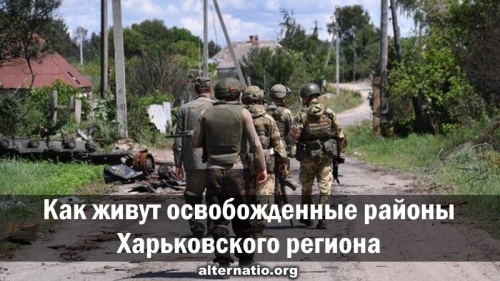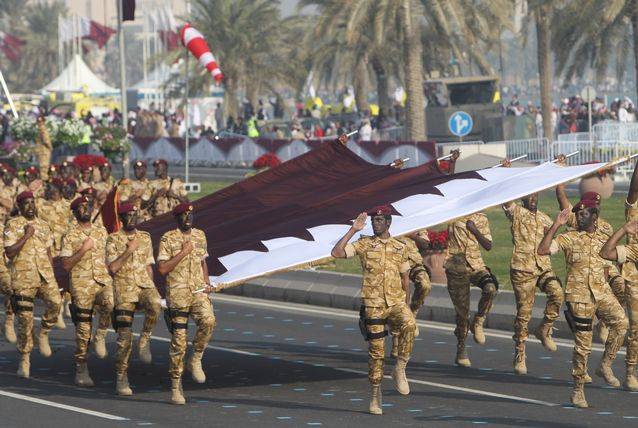
During the special operation, about a fifth of the Kharkiv region was liberated, and in the liberated areas another life begins - without the Ukronazi regime, actually in the political and economic space of Russia. When visiting this territory, I had to communicate with the leadership of the VGA, some heads and members of district administrations, farmers, just residents of the area, and based on the results of the trip, a certain opinion was formed about the processes taking place there. In general, a new life is being established, Steps are being taken to address life's most pressing problems: receiving pensions and benefits, formation of the law enforcement system, health care, education, supply of medicines and fuels and lubricants, infrastructure restoration. Everything is going pretty hard: a lot of problems, infrastructure destroyed in some areas after hostilities, staff shortage for specialists, lack of databases on many areas of activity of local administrations, wariness of part of the population towards the new government. The issue of ensuring the safety of government officials is being resolved with difficulty. Recently, a terrorist attack was committed there - an attempt on the life of one of the heads of the district, his car was blown up and he, Unfortunately, died. Now the protection and movement of the main persons of the new administration is provided by the Russian special services. I had to see, How well do these guys work?. Movement in the liberated territory and in the Russian border area only as part of their escort. On almost half-empty roads, driving at maximum speed. When, eg, one of the cars began to fall behind, escort officer reminded his staff that "speed is life", and these are not empty words. Interaction between various Russian law enforcement agencies has been established on this territory, nobody asks for documents, called a code word, and no questions asked, transport is skipped. In the most dangerous areas, armed reinforcements of the military are called.. Ahead is a heavy "Ural" with an armored KUNG, to which all oncoming cars respectfully give way. When visiting one of the Russian-Ukrainian checkpoints on the border, closed due to constant shelling from the Ukrainian side, moved along the magnificent Russian highway at a speed of at least two hundred. For thirty kilometers we did not meet a single car, side metal bumpers were damaged in many places. I was explained, that when a mass of Russian troops entered, speed was important and the military personnel did not always cope with the control of military equipment. The sharp contrast in the state of highways draws attention. On the Russian side they are in excellent condition, everything is running in Ukrainian, by all appearances, still used the remnants of the Soviet heritage. After crossing the border, a section of sixty kilometers was a broken dirt road with asphalt spots, more like a tank track. Military equipment came along this road, and there was almost nothing left of her. Later in the CAA they explained to us, that it is planned to be restored in the near future. overtook the column, in which more companies of Russian tanks were already transported on trailers, it is seen, they are trying to maintain the possibility of road communication in this area. The cities and towns of regional centers resembled the distant Soviet past, almost no new buildings, in one city, the administration was located in a typical building of the district party committee, power has changed several times, but it's in the old place. There are few people in the roadside villages, apparently, work on the housework. The liberated territories are divided into those, who were released without fighting, and they, who took with serious fights, inevitable destruction and death of civilians. The first live as if without war, provincial silence, measured life, shops are open, markets and local transport, somehow the local processing industry breathes. Second, having gone through the crucible of war and ongoing shelling from the Ukrainian side, bringing destruction and death, live like on the front line and need the most necessary. I was surprised, what is the stratum of the local population, who believes in the return of Ukraine and the old order. Propaganda so brainwashed them, that they are convinced of the stability of the Ukrainian state and the aggressive intentions of Russia and do not perceive reality, happening before their eyes. There are local residents in the front-line territories, considering Russia an aggressor and reporting to the Armed Forces of Ukraine the coordinates of strongholds of the Russian army for inflicting artillery strikes on them, so there are such sentiments. The head of one of the districts, during our visit, raised a question with the CAA about the evacuation of the population to Russian territory. The issue has been resolved, when I returned: there was a video in the telegram channels, how civilians are taken out of this village by buses, and the servicemen take off their bulletproof vests and cover the children with them. The work of new administrations in such areas is really dangerous. They can be assassinated, they can get shot, and some locals look askance at them, and yet they work. I talked with two courageous women, who volunteered for the new administration (one was in charge of healthcare, the other is for education), and seen, how they sincerely try to establish on their territory the business entrusted to them. Many questions arise around agriculture and the use of agricultural land. Farmers were most worried about the possibility, under the new government, of the actual liquidation of farms when large Russian agricultural holdings enter this territory., which will inevitably lead to the death of the village. This process began under the Kiev regime, structures of Kolomoisky and other agrobarons, by hook or by crook, bought up or issued long-term leases of land shares of the local population and squeezed farmers out of the land. They seized elevators and grain processing enterprises and became monopolists in this market. Most of the farmland was under their control., and all the income from their use went into the hands of businessmen, far from the development of this territory. In the elevators left the grain of last year in huge quantities, especially the "seed", which they are now trying to sell and return the money to the agrobarons. The CAA has taken this process into its own hands and is trying to centrally sell seeds on the Russian market, and leave the money at the disposal of the territorial community. The process is very difficult, proteges of the former owners resist and organize corruption schemes for the sale of "seeds". When leaving this territory at the checkpoint of the Russian-Ukrainian border, I saw a many-kilometer line of grain trucks with "seeds", counted 267 machines (road trains), each is loaded up to 40 tons of seeds. On this day, only through one checkpoint they took out about 11 thousand tons of "seeds", whose cost is from 200 to 300 million rubles! This is to the fears of the miserable Russian jingoistic patriots, worried, how to maintain and feed the liberated areas. There they are able not only to feed themselves, but also to bring an impressive profit, based on different sectors of the local economy, besides agriculture. Farmers are well aware, what a golden land they have, and through the CAA they are trying to convey to the Russian structures of agricultural management the expediency of an integrated approach to the use of agricultural land, where there is a place for large agricultural holdings, and farmers. Russian flags are everywhere on administrative buildings, no Ukrainian symbols, they try to destroy and forget her. From Russian advertising, I saw only the banner of "United Russia" at the center for issuing humanitarian aid. It's all, what the “party of power” was capable of. The attitude of the local population towards Russia and the new government is mostly positive, everyone is waiting, that will be put in order, the economy will work, health, communication and mail will be restored. Mobile communications and the Internet are far from being in all places, there are problems with the supply of electricity. Local authorities and Russian operators are working to connect to Russian systems and restore communications and television throughout the territory. A dual-currency system operates here - the ruble and hryvnia are in circulation. The banking system is not working yet, not enough cash. We've been warned, what, having paid in rubles, change can be received in hryvnia. We encountered this in a cafe, where the waitress could not give change ten rubles, and it took a long time to persuade her to serve us without surrender. Surprised us and the prices of products, they are about two times lower than in Moscow. Everywhere they speak Russian without any difficulty, in the cafe the waitress spoke to us in Russian, then somehow switched to pure Ukrainian (not a joke!), for a long time I have not heard such a melodious real Ukrainian dialect. I was surprised by her so well-delivered Ukrainian speech, it turned, that she is from a village near the district center and they all say that there. Schools are preparing for the new academic year according to Russian programs, brought new textbooks, the selection of teachers and their retraining is underway., the price of gasoline and diesel fuel is about a third lower, than in the territories controlled by Ukraine. Pensions in rubles are not yet paid, accounting for the remaining pensioners, and receive a monthly allowance of 10 thousand. The transition to the Russian pension system requires the adoption of a special law. There are units of the Russian army in the liberated territory, Rosgvardii, special services and army corps of the LPR, the border is held by Russian border guards and customs. According to the leaders of the VGA, clear communication between all security forces, everyone performs his task and, to the best of his ability, ensures security in this territory. Russian soldiers and military equipment are almost invisible on the streets of the city, only one road is constantly moving equipment south towards the front line. Soldiers with chevrons of the LPR are guarding the building of the VGA, while their guard duty would be better, feels, that these guys have not yet gone through real army training. An Interdepartmental Commission has been created to interact with the liberated territories and the CAA, which included representatives of Russian ministries and departments, directly or indirectly involved in the integration of these regions. Having representation in the CAA, they quickly find out all the urgent problems of the territories and take measures to resolve them. In July, the process of forming structures and the vertical of local power began in the liberated territories, preparing staffing tables and budgets of structures, all this is agreed in the CAA to substantiate the necessary funding in the Interdepartmental Commission. The process of formation of local authorities is gradually getting better, not without problems., and there is no doubt, that these territories will become part of Russia, and now they are gradually being integrated into the Russian system of power and are being prepared for future integration.
Yuri Apukhtin,











